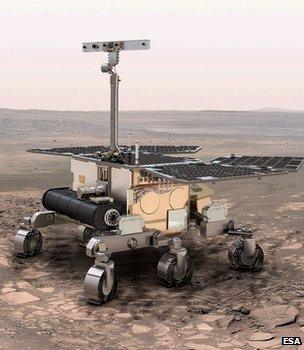Europe still keen on Mars missions
- Published

The ExoMars project was formally initiated by European space ministers back in 2005
Europe is to press ahead with its Mars missions in 2016 and 2018.
Member state delegations to the European Space Agency (Esa) reiterated their support for the ventures during a council meeting in Paris on Thursday.
The plans to send a satellite and rover to the Red Planet were thrown into doubt when the US pulled out because of funding woes.
But Russia will now partner Europe instead, taking on key roles, including the provision of two rockets.
There are, however, many hurdles still in front of the successful implementation of the missions, not least a budget shortfall on the side of the Europeans.
Esa had originally cost-capped the ExoMars projects at a billion euros, but the withdrawal of the US space agency (Nasa) and the consequent reorganisation of the ventures will probably add several hundred million euros to the sum so far raised.
Member states instructed the agency's executive at Thursday's meeting to look at how this shortfall could be made up. One possibility is that other science activities within Esa may have to step back to make ExoMars a priority.
It is likely also that member states will be asked for further contributions when the space ministers of Europe meet in November to set the agency's medium-term policies and budgets.
Previous design
The UK Space Agency's director of science, Dr David Parker, commented after the Paris gathering: "The bottom line is that the programme was very strongly supported around the table as being important for Esa, which means there was no proposal to cancel or anything like that.
"On the contrary, the message was that Esa needs to prioritise to make sure ExoMars happens.
"Of course, it's not straightforward, and the agency will need to do some homework to find the necessary money."
The council also heard the latest thinking on the expected architecture for the two missions.
The 2016 satellite will launch on a Russian Proton rocket and go into orbit to investigate the Martian atmosphere. The absence of the US means Europe and Russia will have to provide instruments that will no longer be sourced through Nasa.
The idea that the satellite despatches a small static lander to the surface is retained, but the Russians are now expected to take a very prominent role on this part of the mission. One bonus will be the provision by Russia of a radioisotope battery to maintain the life of the lander and its instruments on the surface for many months. Esa had earlier only planned for surface operation lasting just a few hours.
Some derivative of the Entry, Descent and Landing (EDL) technology used to put the surface package on Mars in 2016 will now also probably be used to place the 2018 rover on the planet. The Russians will produce most of the hardware, but Europe will handle some key elements such as the guidance and navigation systems.
Like the 2016 satellite, the 2018 rover will be despatched to Mars on a Proton. The design for the six-wheeled robot rover goes back to the one envisaged before Europe thought about teaming up with the US, meaning it will be in the 300kg class.
It will carry an exobiology instrument suite, known as "Pasteur", to look for signs of past or present life. The robot will also drill beneath the surface of the planet to pull up samples for its on-board laboratory.
'Door open' to Nasa
One of the key issues right now is the ever shortening time window to get the 2016 orbiter ready for flight.
Senior figures at Esa and Italian space manufacturer Thales Alenia Space (TAS) will be meeting in the next fortnight to determine whether the preparation schedule is still feasible.
Assuming everyone agrees the goals can be achieved in the four years available, a full contract will be released to TAS in April to get the hardware built.
If the window is considered unrealistic, the whole structure of ExoMars would have to be reconsidered. But there is high confidence that the challenge can be met.
At some point in the next few months, the partnership between Europe and Russia will need to be formalised. This will take the form of a memorandum of understanding between the heads of Esa and the Russian Space Agency (Roscosmos).
Although the Americans turned their backs on ExoMars, Europe is still hopeful Nasa will come back into the ventures in some form at a later date.
"The door always remains open to Nasa, perhaps to do something for 2018 and further consolidate the mission," said a spokesman for Esa director-general, Jean-Jacques Dordain.
"They will always be welcome, so long as they bring support. International cooperation doesn't die just because Nasa said they didn't have the money to do this now."
Jonathan.Amos-INTERNET@bbc.co.uk and follow me on Twitter, external
- Published13 February 2012
- Published6 February 2012
- Published14 October 2011
- Published20 September 2011
- Published5 September 2011
- Published30 June 2011
- Published8 March 2011